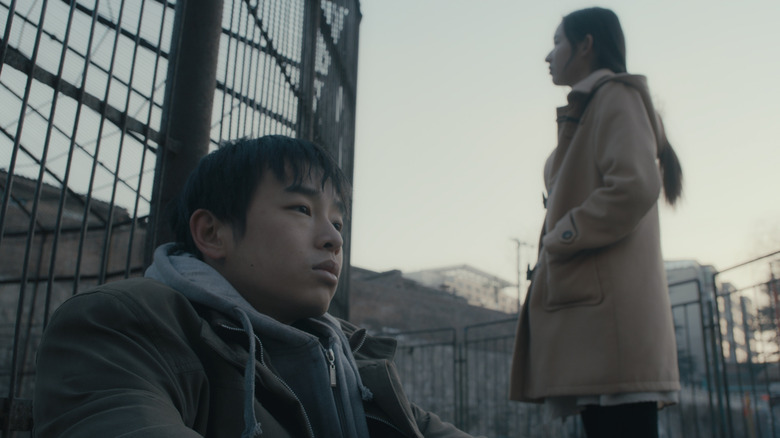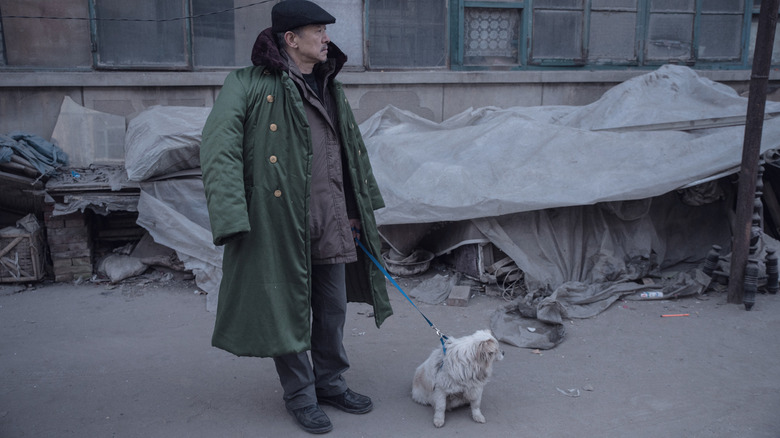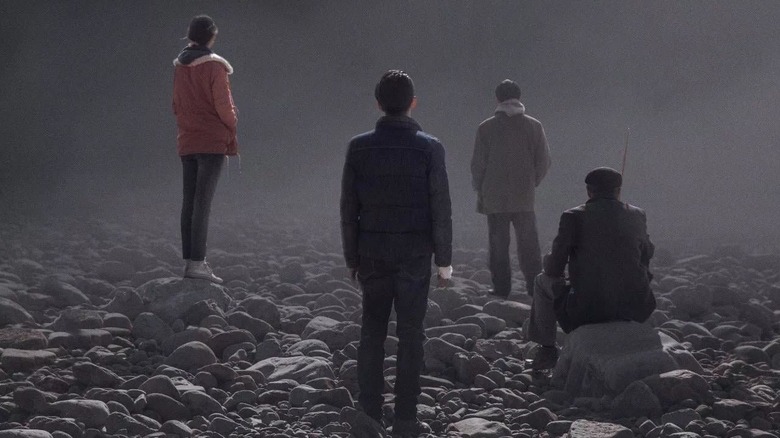The Daily Stream: An Elephant Sitting Still Displays Glorious And Profound Suffering
(Welcome to The Daily Stream, an ongoing series in which the /Film team shares what they've been watching, why it's worth checking out, and where you can stream it.)
The Movie: "An Elephant Sitting Still"
Where You Can Stream It: Ovid, Kanopy.
The Pitch: The first thing you may notice about Hu Bo's excellent, devastating, aggressively depressive 2018 film "An Elephant Sitting Still" is how grey it is. The sky provides no light or color. The buildings have been blasted by nature into a uniform shade of ash. The small, cramped apartments are shaded like clay or putty. There is a sense that the world is shutting down. Jobs are scarce in the small northern Chinese town where the film takes place, and the local high school — already a terrible institution full of violence and condescension — is poised to close in the middle of the school year. This is a city of profound unhappiness, depression, and quiet suffering. The film's title alludes to an exhibit at a circus in Manzhouli, where one may see an elephant sitting still. It can be beaten and struck, and yet it remains still, suffering like Job. A viewer might assume that the characters in "An Elephant Sitting Still" see themselves in the distant Manzhouli elephant. They cannot be moved by their suffering.
And yet, "An Elephant Sitting Still," for how relentlessly bleak it is, feels vital and humane. The characters may be depressive, uncommunicative, occasionally violent, often petty, and sometimes just awful, but Hu Bo sets his camera down, watches them, and invites the audience to see the humanity in the face of a recognizable agony. Hu Bo communicates isolation. His camera constantly lingers close to his subjects, forcing the audience to be boxed in with them, feeling just as lonely as they are, just as disconnected. The elephant is suffering, but perhaps it is not a mere symbol of ongoing pain. Perhaps, Hu Bo posits, there is something admirable in its endurance. The audience may have to endure as well. "An Elephant Sitting Still" runs four hours.
A recognizable frustration
Why It's Essential Viewing: "An Elephant Sitting Still" does not fetishize suffering. This is not a film like 2019's "The Painted Bird" or Elem Klimov's "Come and See" that uses its onscreen suffering as a twisted endurance test, daring the audience to bear the hostility and violence of war in what feels like real time. Nor is "An Elephant Sitting Still" an aggressively provocative work by a self-styled "enfent terrible" like Lars Von Trier or Gaspar Noé. Hu Bo was only 29 when he made his film, yes, so be may have been considered something of an enfent terrible himself, but Hu Bo is the furthest possible thing from a provocateur. He seems to want to capture life in all its complexity, survivalism, and drama. Hu Bo was a student of the great Hungarian master Béla Tarr, a master of slow cinema, famous for his long, long, long gliding shots through silvery rural landscapes. Hu Bo takes a lot of stylistic and tonal cues from his teacher, folding careful and complex social commentary into the surprisingly manifold personal dramas of his characters.
There is the drama of Wei Bu (Peng Yuchang) who is bullied at school and who will eventually confront his bullies to disatrous results. There is the drama of Yu Cheng (Zhang Yu) who will be caught in bed with his best friend's wife. There is the drama of Wang Jin (Liu Congxi) an old man who gets into a brutal fight over the fate of a dog, and who will continue to fight over the fate of the dog. There is the drama of Huang Ling (Wang Yuwen) the teenage girl having an affair with a married man. Oh, and today is her birthday.
Hu Bo
"An Elephant Sitting Still" was Hu Bo's first film and it is also his last. The filmmaker died by suicide in 2017 shortly before completing his film. Any critic will be tempted to bring Hu's death into interpretations of "Elephant," which may be easy, given its dusty patina of sadness and isolation redolent throughout. This sort of interpretation diminishes the greatness of his film, reducing it to a symptom rather than a piece of art.
The film's final shot is a masterstroke, and the four hours of waiting time is most certainly worth waiting through to make it to that moment. It is a moment where the camera finally backs off, contains many people seen from afar, and a has playful use of darkness, light, and sound that will leave you exhilarated from what you just experienced. Have the characters reached a conclusion? Have they been transformed? Is there a catharsis? At the very least, we see that there is still connection to be made — however slight and nonsensical — in a world hazed over by melancholy and anger.
In that moment, "An Elephant Sitting Still" transcends, almost becoming a spiritual experience. The mind is cracked open. One is elevated. We can see a broader spectrum of humanity living.
Suffering. But living.
R.I.P. Hu Bo


